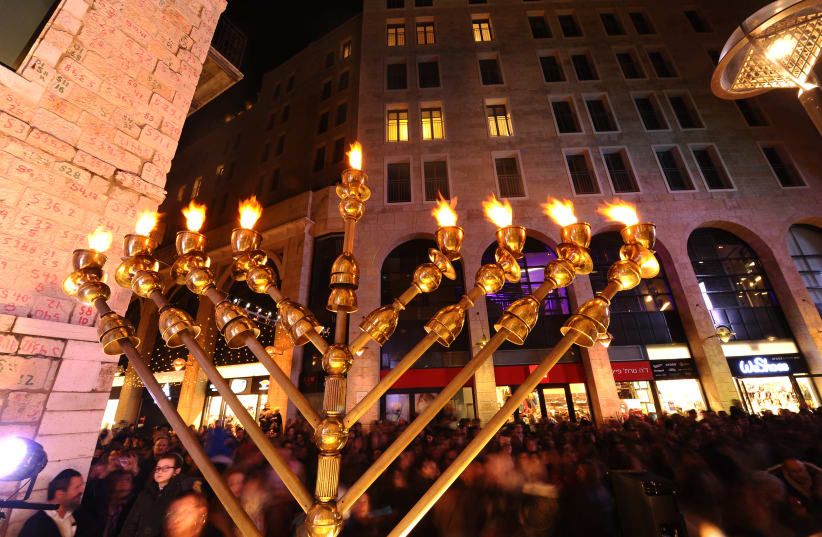Seeking to offset the dour tone of life during the coronavirus pandemic, Jerusalem families are finding creative ways to celebrate the festival of Hanukkah.>> Read more articles from The Media Line.
With COVID-19 restrictions limiting all sorts of events and social interactions, some 600 buildings across Jerusalem are taking part in a city-led initiative known as the Illuminated Building campaign. The project allows neighbors to get to know one another via small outdoor events.
“I believe that a sense of community is what helps residents feel connected to the place they live in,” Hagit Moshe, deputy mayor of Jerusalem, told The Media Line at one such event, which took place in the Pisgat Ze’ev neighborhood Sunday night.
Families from two apartment towers came together in the courtyard between the buildings to eat homemade pizza, sing and dance. Moshe and a few local community leaders gave speeches to those in attendance ahead of a candle-lighting ceremony.
“Even with different beliefs and opinions, if we are good to our neighbors then we can live alongside one another,” Moshe said. “Strengthening these communal ties is very important for us at the Jerusalem municipality.”
It is not the first time that the municipality is holding a communal candle-lighting campaign; however, the pandemic has brought renewed interest in the project.
“This is a lot of fun because now we can finally do something,” Shira, a community activist and leader in the Baka neighborhood, told The Media Line during her own building’s festivities.
“We usually hold neighborly celebrations here throughout the year but because of the virus we haven’t been able to until now,” she said. “We really hope that Hanukkah is the beginning of the end of the coronavirus and that we can go back to normal!”
Also known as the Festival of Lights, Hanukkah is an eight-day-long Jewish holiday that commemorates the rededication of the Holy Temple in Jerusalem during the Maccabean Revolt more than 2,000 years ago. According to the story, a very small quantity of oil used to light the Temple’s menorah miraculously lasted for eight days.
To celebrate the miracle, it is customary to eat jelly-filled donuts and other goodies cooked in oil throughout the holiday. People also light candles, give presents and spin a top, known as the dreidel.
“I really like Hanukkah both because of the donuts and the presents,” 9-year-old Itay told The Media Line in between bites of fresh homemade sfinj, a traditional Moroccan donut that is popular across Israel.
“It’s a great holiday,” he added. “I also like to spin the dreidel. It’s a lot of fun!”Since the start of the pandemic, Jerusalem has turned increasingly to domestic tourism to help bring life back to the city. For Hanukkah specifically, the municipality has enlisted the help of several local women to host small groups of Israeli visitors in their homes and give tours of their neighborhoods in accordance with Health Ministry directives.
One of them is Rebbetzin Dina Brandwein of the Stratyn Hassidic dynasty, who lives in the Jewish Quarter of Jerusalem’s Old City. For over five years, Brandwein has welcomed local tourists to her home—for a nominal fee—to hear stories of her family’s illustrious past and the Old City’s colorful history.
Such visits unfortunately came to a halt when the COVID-19 crisis hit.
“This is the first time I’ve welcomed a group into my house since the start of the pandemic,” Brandwein told The Media Line. “It gives me strength to see people leave here happy.”
